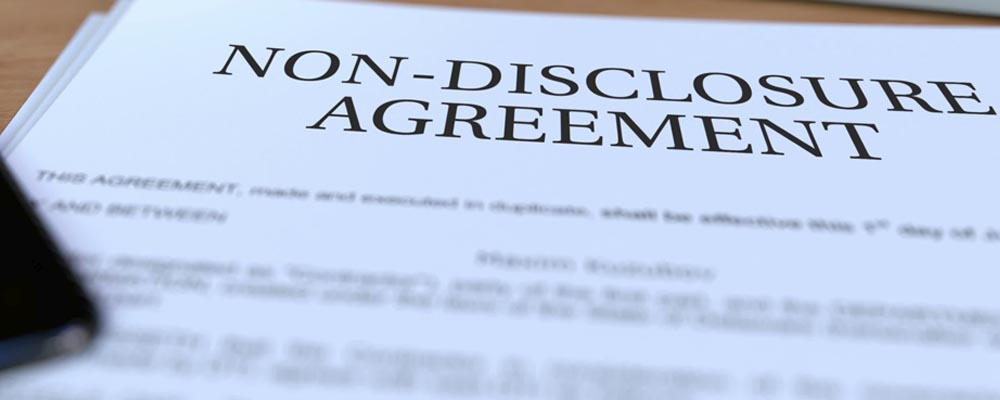NDAs cover up ‘unlawful discrimination and harassment’ across numerous sectors says parliamentary report

In June, the UK Parliament’s Women and Equalities Committee published a report revealing how employers across numerous sectors have historically used non-disclosure agreements (NDAs) to cover up ‘unlawful discrimination and harassment’.
Maria Miller MP is Chair of the Committee, which has been conducting a large-scale inquiry into the misuse of NDAs. ‘Too often the use of NDAs can be [seen] in the context of people who may be Hollywood stars or those in the upper echelons of their profession,’ she says, ‘but the evidence that we had as part of this inquiry was that it's very much something that people can experience really in any walk of life.’
The furore surrounding NDAs and their role in silencing victims first arose in 2017 after it was alleged that film producer Harvey Weinstein had repeatedly used these agreements to prevent individuals from reporting allegations of sexual misconduct against him.
Zelda Perkins, Weinstein’s former assistant, was one of several Miramax employees that came forward. She believes NDAs are still far too commonplace. ‘My overriding impression from all of this is that lawyers have been offering non-disclosure agreements and settlement agreements as a panacea, and they're not,’ she says. ‘Ethically I don't think it's a product that should be sold to people. And if people are going to enter into those agreements it must be made really clear to them what the ramifications are.’
The Committee called on employers to ensure that NDAs are written in ‘plain English’ and are ‘suitably specific about what information can and cannot be shared and with whom’.
Miller says the report should be a ‘wake-up call’ to government and employers. However, legislative action in the UK has been slow. Following the Committee’s first report in July 2018, the government pledged in March 2019 to give employees greater legal protections against the misuse of NDAs.
Progress has been somewhat faster in the US. A number of states have restricted the use of NDAs. In June, New York governor Andrew Cuomo announced plans to expand the scope of the state’s laws to ensure that employers of any size could not use gagging clauses to silence workers, including consultants and independent contractors.
We seem to be in a situation where NDAs have become the rule for dealing with sexual harassment and abuse of power
Elise Groulx Diggs
A national inquiry into sexual harassment in Australian workplaces has also exposed the pervasiveness of NDAs there. Kate Jenkins, Australia’s Sex Discrimination Commissioner, has been leading the inquiry and plans to publish a report, including recommendations for the Australian government, in October.
Jenkins worked in private practice for 20 years and regularly drafted NDAs on behalf of clients. She tells Global Insight she never envisaged these agreements could have such damaging consequences. ‘I never really foresaw that this might have a longer term impact on a broader silence about sexual harassment,’ she says. ‘Usually the parties involved were wanting to put it behind them, so that although it might not have been entered [into] with the idea that we want to silence all sexual harassment, it's just it had become normal practice.’
While there’s continued scrutiny on what regulatory bodies are doing to ensure NDAs are used ethically, Perkins believes legislation is still sorely needed. ‘The regulators have been providing practice notes and guidance and warnings, but that's not enough,’ she says.
Perkins fears the failure to strengthen legislation and regulation could thwart efforts to change the culture that has facilitated the widespread abuse of NDAs: ‘My concern is that in another five years it will slide back, but it'll slide back to a worse place because of the light that's been shone on it now. When solicitors make these agreements they will make them harder to find, deeper and more complex because…they have an inkling now that this is not as acceptable as it once was.’
There have been calls for governments to require employers to publicly report on their use of NDAs. Miller says greater transparency is needed, but feels such reporting requirements may still ‘leave people with the ability to circumvent that in ways which would be difficult to know about’.
Elise Groulx Diggs, an Associate Tenant at Doughty Street Chambers, doubts that mandatory reporting would engineer the necessary cultural change required to combat the misuse of NDAs. ‘Unless we’re confident that reporting NDAs is going to gradually eliminate them, I’m very sceptical,’ she says, commenting in her personal capacity as a human rights law practitioner.
‘Today, we seem to be in a situation where NDAs have become the rule for dealing with sexual harassment and abuse of power,’ says Groulx Diggs. ‘Yet in my opinion the UN Guiding Principles on Business and Human Rights state clearly that companies have the responsibility to prevent, mitigate and remedy human rights violations in the workplace, including harassment. I would also suggest that they have a responsibility to build a culture that helps prevent this kind of abuse. This means doing a lot of education, but it’s also about designing new alternative dispute resolution mechanisms that create a safe space for victims and whistleblowers to speak out and get the support they need.’